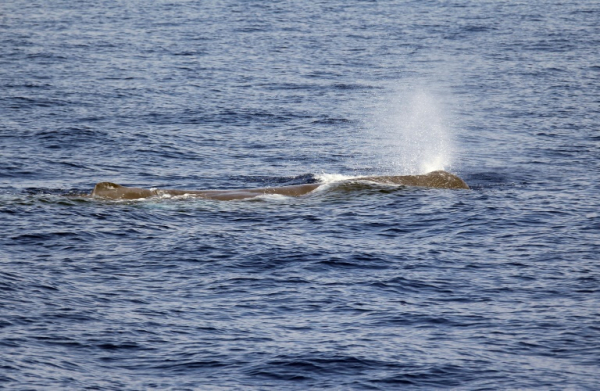Sperm whale ‘clicks’ help scientists understand behavior

Australian researchers hope the audio recordings will eventually help them measure the number of sperm whales that use Antarctic waters © VALERY HACHE – AFP
Scientists have recorded thousands of hours of “clicks” that sperm whales make to forage for food and communicate, helping them better understand the behavior of one of the Southern Ocean’s key predators.
Sperm whales, which can measure up to 20 meters (67 feet) long, are listed as “vulnerable” to extinction.
The Australian researchers hope the audio recordings will eventually help them measure the number of sperm whales that use Antarctic waters, which will in turn assist with efforts to manage their survival.
They recorded whale vocalizations over six years using custom-designed and built acoustic moorings, and found they had four types — slow clicks, usual clicks, creaks and codas.
“Slow clicks and codas are thought to be linked to communication, while usual clicks and creaks are linked with echolocation and foraging,” said Australian Antarctic Division acoustician Brian Miller, who worked with ecologist Elanor Miller on the project.
“Usual clicks are produced about 80 percent of the time the whales are underwater, which makes the whales ideal subjects for acoustic monitoring.”
The usual clicks had a “regular beat” that the whales use to echolocate prey such as fish and squid, they added.
The scientists used a computer algorithm to analyze more than 46,000 hours of underwater sound recorded at three sites off East Antarctica with the aid of underwater microphones.
The acoustic moorings were built to withstand zero degree Celsius (32 degrees Fahrenheit) water temperatures at depths of up to 3,500 meters (11,480 feet), allowing for continuous recording.
“This is the first study to directly measure the seasonal presence and daily behavior of sperm whales in Antarctica,” said Miller, whose findings were published in the journal Scientific Reports.
The recordings showed adult male sperm whales forage in Antarctic waters in summer and autumn, and leave the region when heavy sea ice sets in over winter.
“We also found the whales predominantly foraged during daylight hours and were silent at night, possibly due to the availability of their prey,” he added. MKH
RELATED STORIES:
Four sperm whales die in Indonesia beach rescue